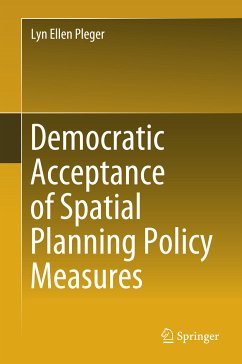In this work, the democratic acceptance of spatial planning instruments is investigated from various perspectives in the form of original empirical studies, which are embedded in an innovative conceptual framework. It demonstrates that not only spatial planning instruments in general, but also incentive-based instruments in particular, generally enjoy high acceptance. This finding is remarkable, considering the fact that efficient land use instruments have only been marginally implemented. Addressing the needs of both academics and land use practitioners in the private and public sector, the book shows that in order to improve the democratic acceptance of spatial planning measures, attention must be paid to their context, content and the means by which that content is provided.
Dieser Download kann aus rechtlichen Gründen nur mit Rechnungsadresse in A, B, BG, CY, CZ, D, DK, EW, E, FIN, F, GR, HR, H, IRL, I, LT, L, LR, M, NL, PL, P, R, S, SLO, SK ausgeliefert werden.









